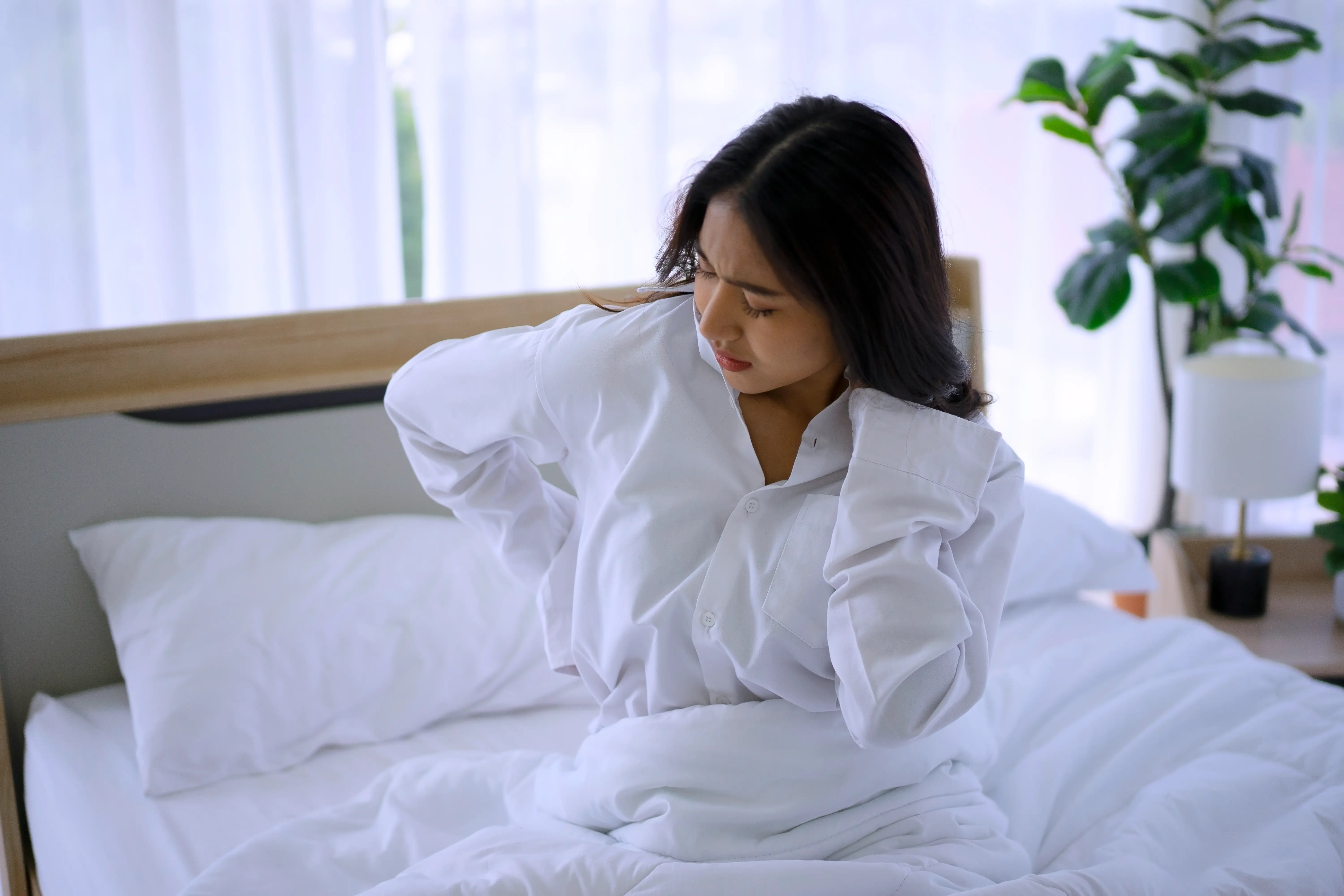The importance of sleep cannot be overstated, as it plays a crucial role in physical recovery and overall well-being. When sleep is disrupted, whether due to discomfort, stress, or an unsuitable sleep environment, the body's ability to repair itself is compromised.
Body aches in the morning or waking up with sore muscles is a common type of sleep discomfort and can be a sign of poor sleep quality or inadequate rest.
In this article, we will discuss the causes of waking up with body aches, which sleep disorders contribute to it, and effective strategies to reduce this occurrence.
What Happens to the Body During Sleep?
During sleep, the body undergoes a series of complex physiological processes essential for overall health and well-being. Various stages of sleep, including REM and non-REM, facilitate critical functions such as memory consolidation, tissue repair, and hormone regulation.
During deep sleep, the body experiences a decrease in heart rate and blood pressure, allowing for restorative processes to occur.
Additionally, the immune system is bolstered during sleep, enhancing the body’s ability to fight infections. Overall, sleep plays a vital role in maintaining physical and mental health by ensuring the body can recover and rejuvenate effectively.
Why Morning Aches Are Different From Daytime Pains?
Morning aches often differ from daytime pains due to physiological changes that occur during sleep. At night, the body undergoes various restorative processes, including muscle repair and inflammation reduction, which can lead to stiffness upon waking.
Conversely, daytime pains are typically influenced by activity levels, posture, and potential strain on muscles and joints. The transition from a resting to an active state can exacerbate existing issues or create new discomforts.
Understanding these differences is essential for effective pain management and can aid in determining appropriate treatment strategies for both morning aches and daytime pains.
Lifestyle-Related Causes of Morning Aches

Morning aches can significantly impact one's daily routine and overall well-being.
Various lifestyle-related causes contribute to these discomforts, often linked to inadequate mattress or pillow support, poor posture, stress, and lack of physical activity.
Poor Sleep Posture
Poor sleep posture or sleeping position, such as sleeping on your stomach or in twisted positions, can lead to muscle strain and discomfort upon waking. When the spine is not properly aligned during sleep, it can cause tension in the neck, back, and shoulders, resulting in persistent morning aches that can affect daily activities.
Inadequate Mattress or Pillow Support
The choice of mattress or pillow plays a crucial role in determining sleep quality and comfort. An inadequate mattress that does not provide proper support may lead to misalignment of the spine, exacerbating morning discomfort.
Similarly, pillows that are either too high or too low can place undue stress on the neck, leading to stiffness and pain. To alleviate these issues, it is essential to invest in a quality mattress and pillow that cater to individual sleep preferences and promote a healthy sleeping posture.
Check our guide to buy the best mattresses and pillows that fit your needs and provide the most comfort.
Room Temperature and Air Quality
Poor air quality in the bedroom, due to dust, allergens, or inadequate ventilation, can affect sleep quality and lead to muscle stiffness upon waking.
Additionally, an uncomfortable room temperature, whether too hot or too cold, can disrupt sleep patterns and contribute to aches and pains in the morning. Ensuring a well-ventilated space with optimal temperature settings can help mitigate these discomforts.
Sedentary Lifestyle
Prolonged periods of inactivity can lead to muscle tightness and weakness, resulting in morning aches. Individuals who spend excessive time sitting or engaging in minimal physical activity may find that their bodies are not adequately prepared for movement each day.
Incorporating regular exercise and stretching into one's routine can significantly alleviate these issues, promoting better overall musculoskeletal health and reducing the likelihood of waking up with discomfort.
Stress and Tension
Lifestyle-related causes of morning aches often stem from factors such as stress and tension. Elevated levels of stress can lead to muscle tightness, particularly in the neck, shoulders, and back, resulting in discomfort upon waking.
Physical and Biological Causes of Morning Aches
Morning aches can arise from various physical and biological factors; understanding these physical and biological causes behind these aches is essential for addressing them effectively.
Dehydration
One significant factor contributing to morning discomfort is dehydration. During sleep, the body continues to lose water through respiration and perspiration, which can lead to a state of dehydration by morning.
This lack of adequate hydration can result in muscle cramps and stiffness, making it difficult to start the day feeling refreshed and energized.
Nutrient Deficiencies
Essential vitamins and minerals play a vital role in muscle function and overall bodily health. For instance, deficiencies in magnesium or potassium may lead to increased muscle tension and cramps, particularly after a night of limited movement.
Furthermore, inadequate levels of vitamin D can affect calcium absorption, leading to weakened bones and musculoskeletal discomfort. Addressing these nutrient deficiencies through a balanced diet or supplementation can significantly alleviate morning aches and enhance overall well-being.
Underlying Health Conditions
Morning aches can significantly impact one's quality of life, often serving as a signal of underlying health conditions.
Early diagnosis and intervention are key to improving overall well-being and reducing the impact of these conditions on daily life. Therefore, individuals experiencing persistent morning aches should consult healthcare professionals for a comprehensive evaluation and individualized care plans.
- Arthritis: Arthritis, characterized by inflammation of the joints, can lead to stiffness and pain that is markedly worse in the morning. This increased discomfort is often attributed to prolonged inactivity during sleep, which can exacerbate the inflammatory processes. As the day progresses and movement increases, individuals may experience some relief, but the initial morning discomfort can be quite debilitating. Check our list for the Best Mattresses for Arthritis and Joint Pain.
- Fibromyalgia: This disorder is characterized by widespread musculoskeletal pain accompanied by fatigue, sleep disturbances, and cognitive issues. The mechanisms behind fibromyalgia are complex and involve abnormal pain processing in the brain and nervous system. Patients often report heightened sensitivity to pain upon waking, which can be exacerbated by poor sleep quality. Check our list for the Best Mattresses for Fibromyalgia.
- Chronic Fatigue Syndrome: Chronic Fatigue Syndrome (CFS) is a debilitating disorder characterized by extreme fatigue that does not improve with rest. Individuals with CFS may experience widespread pain, sleep disturbances, and cognitive difficulties, leading to persistent morning discomfort.
Overexertion or Physical Activity
Engaging in strenuous physical activities without allowing adequate recovery time can lead to muscle fatigue and soreness. Many individuals may push their bodies beyond their limits during workouts or physically demanding jobs, resulting in micro-tears in muscle fibers that manifest as aches the following day.
It is crucial for individuals to recognize the importance of rest and recovery, as well as the need for incorporating stretching and flexibility exercises into their routines to mitigate the effects of overexertion.
Know more about the Best Time to Exercise for Better Sleep.
Age-Related Causes of Morning Aches
Understanding the connection between aging and morning aches is essential for developing strategies to mitigate morning aches and promote overall well-being in older adults, as implementing lifestyle changes can significantly improve sleep quality and enhance muscle recovery.
Natural Joint Degeneration
As individuals age, the cartilage that cushions joints can wear down, leading to stiffness and discomfort upon waking. This degeneration can be exacerbated by factors such as reduced physical activity, weight gain, and previous injuries.
Additionally, the body's production of synovial fluid, which lubricates joints, may decrease with age, further contributing to morning aches.
Aging Effect on Sleep Quality and Muscle Recovery
As individuals age, they often experience morning aches due to several age-related factors. One significant contributor is the aging effect on sleep quality, which tends to diminish with advancing years.
Poor sleep can hinder the body's ability to recover from daily physical exertions, leading to increased muscle stiffness and discomfort upon waking.
Furthermore, the aging process affects muscle recovery, resulting in prolonged soreness and reduced flexibility.
Sleep Disorders That May Contribute to Aches

Sleep disorders can significantly impact overall health and well-being, often leading to physical discomfort and pain upon waking.
By addressing these disorders through appropriate treatments and lifestyle adjustments, individuals can improve their sleep quality, reduce morning aches, and enhance their overall well-being.
Sleep Apnea
Obstructive sleep apnea is a serious sleep disorder characterized by pauses in breathing during sleep. These interruptions can lead to fragmented sleep, which prevents the body from achieving restorative rest. Individuals with Sleep Apnea often wake up feeling fatigued and may experience muscle soreness or headaches as a result of poor sleep quality.
The constant struggle for air can also lead to increased muscle tension throughout the body, contributing to morning aches. Effective management of Sleep Apnea—through lifestyle changes, CPAP therapy, or other medical interventions—can alleviate these symptoms and promote better overall health.
Know more about the Best Sleeping Position for Sleep Apnea.
Insomnia
Chronic insomnia can lead to a host of physical issues, including fatigue, irritability, and muscle tension. When sleep is consistently disrupted, the body cannot repair itself properly overnight, which can result in waking up with aches and pains.
Individuals who suffer from insomnia may find that they are more prone to tension headaches or generalized muscle soreness due to the lack of restorative sleep. Addressing insomnia through cognitive behavioral therapy, relaxation techniques, or medication can greatly improve sleep quality and reduce associated morning discomfort.
Restless Leg Syndrome
Restless Legs Syndrome (RLS) is characterized by an uncontrollable urge to move the legs, often accompanied by uncomfortable sensations. This condition can make it difficult for individuals to fall asleep or maintain uninterrupted sleep throughout the night.
The constant movement can lead to muscle fatigue and discomfort upon waking. Those with RLS may wake up feeling unrested and experience aches in their legs or lower back because of disrupted sleep patterns.
Treatment options for RLS include lifestyle changes, medications, or supplements that target underlying deficiencies.
Bruxism
Bruxism, the involuntary grinding of teeth during sleep, is yet another condition that can lead to morning aches. This often subconscious habit places significant strain on the jaw muscles and can result in tension headaches or even neck and shoulder pain upon waking.
Those who grind their teeth may also experience dental problems over time. Interventions such as custom mouthguards or stress management techniques can help mitigate the effects of bruxism and promote a more restful sleep experience.
Specific Areas of Pain and What They Might Mean
Specific areas of pain upon waking might indicate underlying issues that warrant attention.
Understanding these specific areas of pain is crucial to identifying potential health concerns and making necessary adjustments to your sleep environment and habits.
By paying attention to these signals from your body, you can take proactive steps toward improving your overall sleep quality and well-being.
Neck and Shoulder Pain
Waking up with neck pain and shoulder pain is a common complaint that can significantly impact daily functioning. The causes of this discomfort can vary widely, ranging from poor sleeping posture to underlying medical conditions.
One primary cause is the spine alignment during sleep; using an unsuitable pillow or mattress can lead to muscle strain and tension in these areas. Additionally, spending prolonged hours in front of a computer or engaging in repetitive activities can contribute to muscular imbalances, leading to discomfort upon waking.
Check our list for the Best Mattresses for Neck and Shoulder Pain.
Lower Back Pain
Waking up with lower back pain can be a disconcerting experience that may signify underlying issues. One of the primary causes of this discomfort is poor sleeping posture.
When individuals sleep on their stomachs or in positions that do not adequately support the natural curvature of the spine, it can lead to muscle strain and stiffness upon waking.
Additionally, inadequate support from a mattress that is either too firm or too soft can exacerbate these issues, leading to misalignment of the spine throughout the night.
Hip and Knee Stiffness
Waking up with stiff legs in the morning or with hip and knee pain can be a common experience for many individuals. This discomfort often indicates underlying musculoskeletal issues that may stem from various causes.
One prevalent cause is arthritis, which can lead to inflammation in the joints, resulting in pain and stiffness, particularly after periods of inactivity, such as overnight rest.
Additionally, tendinitis or bursitis in the hip or knee regions can also contribute to morning stiffness, as these conditions involve irritation of the tendons or bursa surrounding the joints.
Check our list for the Best Mattresses for Hip and Knee Stiffness.
Hand, Foot, or Finger Aches
Waking up with specific areas of pain, particularly in the hands, feet, or fingers, can be indicative of underlying health issues. For instance, experiencing stiffness or aches in the hands may suggest conditions such as arthritis or carpal tunnel syndrome. These conditions often result from repetitive strain or inflammation, leading to discomfort upon waking.
Similarly, foot pain, particularly in the heels or arches, may be associated with plantar fasciitis or other forms of tendonitis. These ailments often manifest after periods of rest, as the muscles and tendons may tighten overnight.
Tips for Prevention and Relief

Waking up with body aches can significantly impact your day, but there are effective strategies to prevent and alleviate discomfort.
By focusing on these strategies, individuals can achieve better sleep quality and, consequently, improved physical and mental health.
Sleep Position Adjustment
Proper alignment of the body during sleep can greatly influence the quality of rest and minimize discomfort. For instance, side sleeping can alleviate pressure on the spine.
Making small adjustments, such as using specific pillows or altering mattress firmness, can yield substantial benefits in sleep quality and reduce body aches.
Improve Sleep Hygiene
Improving sleep hygiene involves creating a conducive sleep environment and establishing a consistent bedtime routine.
Maintaining a cool room temperature, minimizing light and noise, and limiting screen time before bed can significantly enhance the chances of restful sleep and reduce body aches when waking up.
Gentle Morning Stretching
Incorporating a gentle morning stretch into your routine can also be beneficial. Engaging in light stretching exercises shortly after waking helps to increase blood flow, relieve tension in muscles, and improve flexibility.
Focus on stretches that target the neck, shoulders, back, and legs, allowing your body to gradually awaken from its resting state.
Stay Hydrated
One essential tip is to stay hydrated. Dehydration can lead to muscle stiffness and discomfort, so ensuring that you drink enough water throughout the day is crucial. Dehydration can lead to muscle stiffness and discomfort, so ensuring that you drink enough water throughout the day is crucial.
Consider a Bedtime Routine
Consider a bedtime routine that promotes relaxation and prepares your body for restful sleep.
This may include activities such as gentle stretching, meditation, or reading, which can help alleviate tension accumulated during the day.
When to See a Doctor About Morning Aches
Morning aches can be a common experience; however, it is crucial to recognize when they warrant professional attention.
Consulting a healthcare professional can provide clarity on the cause of your morning aches and guide you toward effective treatment options.
Persistent or Worsening Pain
If you find that your discomfort is persistent or worsening pain, it may indicate an underlying health issue that needs to be addressed. Conditions such as arthritis, fibromyalgia, or even sleep disorders can contribute to such symptoms.
Swelling, Redness, or Joint Stiffness
If you notice persistent swelling, redness, or joint stiffness in the morning that does not improve throughout the day, it is essential to seek medical advice.
These symptoms could signify underlying conditions or inflammatory disorders.
Negative Impact on Daily Function or Mobility
Morning aches can be a normal part of waking up, but knowing when to seek medical advice is crucial, especially if they have a negative impact on daily function or mobility.
If you experience persistent pain that lasts for several days, worsens over time, or is accompanied by other concerning symptoms such as swelling, numbness, or severe stiffness, it is essential to consult a healthcare professional.
FAQs
Is it normal to feel sore every morning?
Feeling sore every morning can be a common experience for many individuals, particularly those who engage in regular physical activity or lead an active lifestyle.
Why do my joints hurt even when I haven’t done anything strenuous?
Joint pain can arise even in the absence of strenuous activity due to various underlying factors. Conditions such as arthritis, inflammation, or previous injuries may contribute to chronic discomfort.
What kind of doctor should I see if this keeps happening?
The type of doctor you should see will depend on the nature of your symptoms. For persistent pain, consider visiting a pain management specialist or an orthopedic doctor. If your concerns are related to gastrointestinal issues, a gastroenterologist would be the best option.
Can food affect how my body feels in the morning?
Food plays a significant role in determining how your body feels in the morning. The types of nutrients consumed the night before can influence sleep quality and overall energy levels.
Should I exercise in the morning if I wake up sore?
Exercising in the morning when waking up sore can be beneficial, but it requires careful consideration. Engaging in light activities, such as stretching or low-intensity workouts, can promote blood circulation and alleviate muscle stiffness. However, it is crucial to listen to your body; if soreness is severe or accompanied by pain, rest may be the best option.
Conclusion
Waking up with body aches can be a common experience, often attributed to various factors such as sleep posture, mattress quality, or even underlying medical conditions.
Poor sleep habits and an inappropriate sleeping environment can lead to muscle stiffness and discomfort. Additionally, conditions like arthritis or fibromyalgia may exacerbate morning aches.
It is essential to assess your sleeping arrangements and overall health to mitigate these discomforts. Seeking professional advice can lead to tailored solutions, ensuring a more restful and pain-free awakening. Prioritizing sleep hygiene is crucial for overall well-being.
Dom Abraham
As the lead content writer at Sleepiverse. Dom pours his heart into writing mattress reviews, bedding product reviews, and medically-reviewed health articles. Dom is from Portugal and likes to spend his free time writing on the beach as it gives him a sense of comfort. Aside from writing mattress reviews in front of the soothing beach view, Dom likes to experiment with new amazing food ideas.


